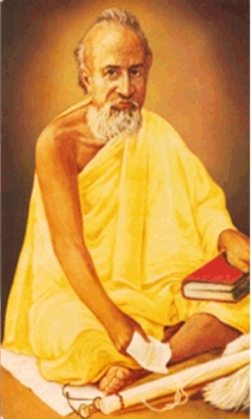Jainism is one of the oldest religion of all known existing religions founded billion of billion years ago in this cycle by Lord Adinath, first tirthankar & Lord Mahavir, 24th Tirthankar actually revived Jainism mis-represented as founder of Jainism.
The Jain religion, according to the Jain scriptures is eternal, revealed in every cyclic period of the universe. The time is divided into 2equal half cycles namely Utsarpini (ascending) Kal & Avasarpini (descending) Kal. Each cycle is again divided into six divisions known as aras. The aras of Avasarpini are in reverse than in Utsarpini. There are 24 tirthankars in each half cycle. There has been infinite number of half cycles in past and there will be infinite number of half cycles in future. Jainism is based on laws of nature and truths of the universe. Therefore, Jainism has been in existence since the laws of nature have been in existence. Therefore, Jains believe that the Jain religion has been in existence since the time without beginning and will have no end.
Param Pujya Acharya Vijayandsuri (Muni Atmaram ji) was worldwide famous Great Jain Saint who could see centuries & ages ahead of their time. His outlook was very wide; his heart was full of kindness & sympathy, thirst for virtues, deep knowledge of various scriptures, great intuition powers, and unbeatable desire to be under Jainism and study its highest literature was the essential qualities of his nature.
Acharya Vijayanadsuri (Atmaramji) was born in 1821 CE in a Kapoor Khatri family. At the age of 16, he was initiated in Sthanakwasi Jain order. Later in VS 1875, he was initiated by Muni Buddhivijaya of tapa gaccha. In 1886, he was conferred the title of Acharya at palitana. Previous such honour of being conferred the title of an Acharya was almost four centuries ago. (1)
Acharya Vijayanandsuri ji (Atmaramji Muni), a versatile, far-sighted Jain saint-scholar, author of several learned treatises was invited to participate in first ever the Parliament of World Religions at Chicago, USA in 1893. The principles of right conduct for a Jain monk prevented him from going abroad. Since he wanted awareness about Jainism to be re-presented at this Congress, he trained and deputed 29 year-old, charismatic Virchand Raghav ji Gandhi (VRG) (August 25, 1864 - August 7, 1901). VRG then was a young barrister, great exponent of Indian culture-religions, a polyglot knowing 14 languages, secretary of Jain Association of India, Mumbai and was well-versed in Jainism, Buddhism, Hinduism, Christianity, Western philosophies, Yoga, etc. Its note worthy that at age of 21 VRG became first hon. Secretary of Jain Association of India in 1885.
VRG and Swami Vivekananda sailed at the same time to participate at the Parliament with same goals; both personalities wearing traditional turbans, made tremendous appearance and had claimed equal attention at the Congress for awakening the western world of the spiritual heritage and rich past history of India. Shri Virchand Gandhi's life was full of incidents and events, which were rare, even in the life of great personages of those times.
1893, World Religions parliament was held at the Columbus Hall of Art Institute of Chicago with more than 3000 delegates of different nations and religions & such conference lasted for 17 days.
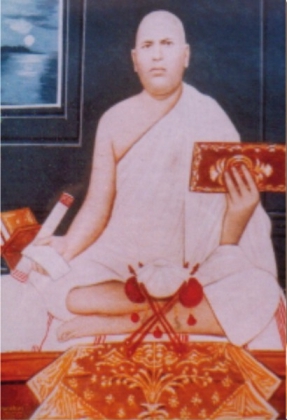 Acharya Atmaram ji |
VRG, at the Parliament of World Religions conveyed, “You have heard so many speeches from eloquent members, and I shall speak later on at some length. I will, at present, only offer on behalf of my community and their high priest, Muni Atmaramji, whom I especially represent here, our sincere thanks for the kind welcome you have given us. This spectacle of learned leaders of thought and religion meeting together on a common platform and throwing light on religious problems has been a dream of Muni Atmaram ji’s Life. He has commissioned me to say to you that he offers his most cordial congratulations on his own behalf, and on behalf of the Jaina community, for your having achieved the consummation of that grand idea, of convening a Parliament of Religions. I wish that the duty of addressing you on the history and the tenets of the Jaina faith had fallen on that able person than on me. The inclemency of the climate, and the distant voyage which one has to undertake before one can come here, have prevented that able Jaina from attending this grand assembly and personally presenting to you the religious convictions of the Jainas. You will, therefore, look upon me as simply the mouthpiece of Muni Atmaram ji, the learned high priest of the Jainas in India, who has devoted his whole life to the study of that ancient faith. ”.
“I represent Jainism, a faith older than Buddhism, similar to it in its ethics, but different from it in its psychology, and professed by a million and a half of India's most peaceful and law abiding citizens”. He expounded to them what this universe is; whether there is God as the creator of this universe; what is the ultimate purpose of life and several such other things. He explained to them navatatva, shaddravya, chargati, panchavratha, Moksha, nyayavad, Anekanthavad. He re-presented or corrected the false and perverse impression of India as being the land of maharajahs, tigers and cobras. He narrated an incident from King Akbar’s life and praised him for respecting all other religions. He spoke as an Indian first but kept Jainism at his heart. When one consciously suppresses individuality by proper physical, mental, moral, and spiritual development, one becomes part and parcel of immutable course of nature, environment, and ecology and never suffers, said VRG on Jain Yoga Philosophy.
Shri Gandhi said, "It is an astonishing fact that foreigners have been constantly attacking India and in the face of all this aggression the soul of India has stood vital and watchful. Her conduct and religion are safe and the whole world looks at India with a steady gaze." He added "Cultural distinctions, agriculture, art, artistic skill, literature, good conduct, means of knowledge, science, hospitality, feminism, love, and respect - all these are found in India in quite a different form. If that culture was purchasable, England would have purchased it, adopted it. But it has not happened, it cannot happen."
As a true patriot, VRG talked about economic and political freedom five decades before India became independent. He proclaimed at the parliament that if India became independent, she would never invade any other country with violence. Today this statement appears as a prophecy that Mahatma Gandhi (1869-1948) proved in attaining India's freedom with peaceful means.
VRG’s speeches also created a deep brilliant image that American people were magnetically attracted towards him and at their request VRG prolonged his stay for two years and was invited twice later in 1897 and 1899. He delivered as many as 535 lectures mainly in Chicago, Boston, New York, Washington of USA, England, France, Germany and other European countries. At all these places he was well listened, felicitated and presented with medals.
VRG defended Hinduism at the Parliament under unjust criticism by elaborating its principles. In those days, sea voyage was considered as unholy and VRG faced unjust criticism for the same. Swami Vivekanand wrote in 1894 from 541, Dearborn Avenue, Chicago, to the Diwan of Junagadh “Now here is Virchand Gandhi, the Jain whom you knew well in Bombay. This man never takes anything but mere vegetables even in this terribly cold climate and tooth and nail tries to defend his countrymen and religion. The people of this country like him very well. But what are they doing who sent him over? They are trying to outcast him.”
Swami Vivekanand’s work became well-known but unfortunately little was known about VRG’s! One of the U.S. periodicals wrote while giving tribute to both of them when VRG and Swamiji died in 1901 and 1902 respectively, “The influence of Vivekanand’s philosophy has been kept alive by his disciples by founding organization like Ramkrishna Mission whereas, it is a matter of great pity that no attempt has been made to keep alive VRG’s memory!”
Herbert Warren, a religious enthusiast, abandoned non-vegetarianism and adopted the Jain religion. He took notes from VRG’s lectures and wrote a book on Jainism. V. Glasenapp, a Well-known German scholar wrote his doctoral dissertation on the Jaina Doctrine of Karma and acknowledged VRG’s influence. Hon. E. B. Sherman Master in Chancery of the United States, Circuit Court, wrote on VRG “It has rarely, if ever, been my good fortune to meet a man whose reading and culture have been so wide and varied, and who, withal, has so sweet, sincere and teachable a spirit as Mr. Gandhi’. E. Allen Richardson in "Strangers in This Land" mentioned about the Parliament and VRG’s interview with New York Times.
Lion of the season, VRG’s immense success was covered by the following list of leading newspapers, and periodicals of USA: A) New York Times, B) St. Joseph Gazette, C) The Jamestown New York, D) Editors Bureau, E) Chicago Daily Sun, F) Chicago Herald, G) Chicago Suburban Star, H) Light of Truth, Cincinnati, I) Buffalo Times, J) The Illustrated Buffalo Express, K) Morning Star, L) Buffalo Evening Times, M) Buffalo Express, N) Buffalo Courier, O) The Evangelist, P) Evening Post, Q) Rochester Democrat and Chronicle, R) The Rochester Herald, S) Rev. R. A. White, Chicago, T) Addison Parker Pastor of leading Baptist Church.
VRG wrote many articles and books in Gujarati as well as in English. He wrote on topics of social and cultural reforms like education for women and custom of repenting. VRG translated many publications, including The Unknown Life of Jesus Christ in English from French in 1894 from an ancient manuscript found in Tibet. VRG’s selected speeches titled “Jainism in Western Garb as a solution to the Life’s Great Problems” and other compilations were also published. |
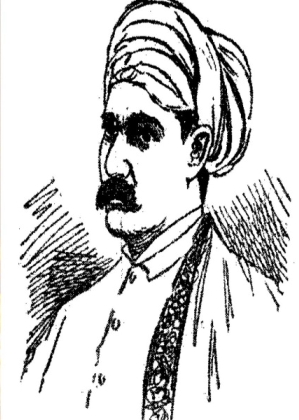 Virchand Raghav Gandhi |
In his last days VRG was in England for Shatrunjay-Palitana Tirth matter and succeeded in getting poll tax on Jain pilgrims abolished, risking his own life, being threatened by the Ruler. VRG wanted to continue his activities for a long time and to accomplish much more but unfortunately he could not, as this brilliant and promising young man, full of hopes and aspirations died at a very young age of 37 on August 7, 1901, within two months of his returning from third journey of the West, leaving unbridgeable void. The Jain community in mourning his death kept their business closed for five days. His short life span was full of great achievements. He sacrificed his brilliant legal career for the cause of Jainism and died in service to humanity.
In 1891, he was responsible in winning the case known as “Piggery Case” in Calcutta High Court for closing down the slaughterhouse run by an Englishman at Sametshikhar Pilgrimage. For this he had stayed in Calcutta for six months and learnt Bengali language to prepare the brief which was lost at the lower court. As a true humanitarian, he sent Ind.Rs.40, 000 and a shipload of grains from U.S.A. to India during worst famine of 1896-97.
As a reformer he established a] Gandhi Philosophical Society, b] Society for the Education of Women in India (SEWI). Under the banner of SEWI, several Indian women came to U.S.A. for higher studies. c] School of Oriental Philosophy, d] Jain Literature Society in London. As a national figure he attended the Indian National Congress held in Pune as the Representative of then Bombay province in 1895. He attended the International Conference of Commerce in London as an All-Asia sole delegate in 1899 where he advocated reforms of post-parcel system.
Modern research about VRG under JAINA banner has revealed that at several instances Mahatma (M. K.) Gandhi was misunderstood as V. R. Gandhi. VRG and Mahatma Gandhi were in intimate contacts. Since both were studying for solicitor's examination, VRG & Mahatma Gandhi were together for their experiments in dietetics. VRG used to give assistance to M. K. Gandhi in preparing solicitor’s examination by telling him different stories about barrister’s, stalwarts & vakil’s. VRG used to try his best to get mahatma gandhi briefs. (2)
In a 1931, June 13 letter, Mahatma Gandhi clarifies to Miss Emelia, Mac Bean of Chicago when she mistook him as VRG that’ Madam,I have your letter for which I thank you. You are giving me credit of which I am wholly undeserving. You are thinking of another Mr. Gandhi my name-sake but in no way related to me. He and I were however friends and lived together for some time. You will be sorry to hear that he died many years ago, leaving an only son. It was he who visited America and made many friends. I have never had the privilege of visiting your continent’. (Refer http://www.mkgandhi.org/letters/others/macbean.htm). (3)
Mark Twain, father of American Literature was too impressed by Virchand Gandhi & his Jain philosophy & his newspaper Buffalo express had covered immense success of VRG & on Mark Twain’s Visit to India, VRG displayed his hospitality & accompanied him to Jain temples. In MARK TWAIN, on, Biblical & Hindu Miracles - G.B. Singh justifies that Virchand Gandhi had met Mark Twain on his visit to India but somehow western researcher in inventing Mark Twain: The Lives of Samuel Langhorne Clemens by Andrew Hoffman mistook Virchand Gandhi as Mahatma Gandhi, Mahatma Gandhi, at this stage of Mark Twain’s travel, was living in South Africa. (4)
Today western scholars on their study on Swastika do incorporate VRG’s explained details about Swastika as per Jain philosophy. VRG explained the Jain Swastika as follows: the horizontal and vertical lines crossing each other at right angles form the Greek cross. They represent spirit and matter. We add four other lines by bending to the right each arm of the cross, then three circles and the crescent, and a circle within the crescent. The idea thus symbolized is that there are four grades of existence of souls in the material universe. The first is the lowest state–Archaic or protoplasmic life. The soul evolves from that state to the next–the earth with its plant and animal life. Then follows the third state– the human; then the fourth state - the celestial. The word “celestial” is here held to mean life in other worlds than our own. All these graduations are combinations of matter and soul on different scales. The spiritual plan is that in which the soul is entirely freed from the bounds of matter. In order to reach that plane, one must strive to possess the three jewels (represented by the three circles), right belief, right knowledge, right conduct. When a person has these, he will certainly go higher until he reaches the state of liberation, which is represented by the crescent. The crescent has the form of the rising moon and is always growing larger. The circle in the crescent represents the omniscient state of the soul when it has attained full consciousness, is liberated, and lives apart from matter. (5)
In 1964, then monk, Shri Chitrabhanuji was pioneer in initiating the celebration of VRG’s Birth Centenary. This was done on 25th August, 1964 in Fort, Mumbai where he and others addressed a large gathering. Shri Vallabh Suri Smarak Nidhi played a key role in reviving VRG’s contribution in exploring Jainism in the West. In VRG’s birth-town, Mahuva, a statue was erected at the Chowk (Square) in 1993 as his Memorial. Jain Center of Metropolitan Chicago has installed his statue at their temple in 1995. The Ohio Historical Society, Ohio, USA had given a big bronze plaque to the Jain Center of Cincinnati/Dayton in 1994 marking 100 years of VRG’s lecture in Cleveland on September 18, 1894 mentioning that VRG brought Jainism to Ohio State.
JAINA, established VRG Scholarship Committee in 1997 as a homage and in his honor, for advancing, research studies in Jainism and VRG’s unpublished literature at recognised Universities/Institutions and Pravinji C Shah Chair, JAINA,VRG committee from last 10 years has displayed tremendous Passion for VRG mission.
Most awaited postal stamp release in VRG honor, due to joint efforts of JAINA and WJC, by the Department of Post of Government of India has been scheduled in 25 August, 2009. And same would have been impossible without contribution of Shri Daulatji Jain (Chennai), Shri Pradipji Jain (Patna), Shri Maheshji Gandhi (Mumbai) & Shri Pratapbhai Bhogilal (Mumbai) to name few who played major role for Stamp Release project. And also contribution of Past Jaina presidents, Immediate past president Shri Kiritji Daftary, JAINA President Shri Dilipji Shah, Shri Pravinji K Shah, Shri Kumarpalbhai Desai, Shri Prakashji Mody, Shri Chandrakantji Shah, Smt. Rakashaben Shah, Shri Gunvantji Barvalia, Shri Pannalal ji Shah, Shri Swami ji Niktleshwaran, Dr. K.K.Dixit ji, Dr. Pandit Shukla ji, Shri Manu ji Doshi, Dr. Noel King ji, Dr. Surendra ji Singhvi, Shri Himmat ji Gandhi, Smt. Pritiben is highly appreciable.
This year is truly the year of Acharya Atmaramji, for on 21 February, 2009 a commemorative stamp of Acharya Shri Vijayvallabhsuri, his disciple who led the Sangh after him was released. He carried forward dreams and principles of his Guru by building many education institutions nationwide. Today many Jains globally are creating history in their fields had their education from Atma-Vallabh Foundation institutions. JAINA and WJC are planning to convert VRG’s birth-home into his permanent memorial-museum.
Acharya Atmaramji was from Punjab, but place where he had dominance is today in Pakistan i.e. Gujranwala and Darkhana. And that time Jains from this area whole-heartedly supported VRG’s participation for first religions Parliament. That time there was Atmanand Jain Gurukul in Gujranwala. Acharya Atmaram ji’s Samadhi is also in Gujranwala & now at Lahore Museum.
Acharya Vijay Vallabhsuri inherited all qualities of his Guru Acharya Atmaramji & was entrusted responsibility by Acharya Atmaramji to lead sangh after him.The pair of Acharya Atmaramji & Acharya Vijay Vallabhsuri, thought the first need is not to create Jain temples but schools and study centers & hence built nationally many educational institutes.
For deep detailed study on VRG I recommend my personal favourite Book result of blessings & motivation of Pujya Acharya Shri Vijaya-samudrasuri Maharaj, Pujya Agamaprabhakar Shri Punyavijayji Maharaj and Pujya Shri Mragavatishriji i.e Selected Speeches of Virchand Raghav Gandhi by Shri Abheraj H.Baldota & Shri Hiralal H Dalal, Published by Shri Vallabh suri Smarak Nidhi
Today Pujya Acharya Vijay Nityanandsuriji maharaj & Acharya Shri Vijay Dharam Dhurandhar Suri Ji maharaj are carrying forward legacy of Shri Atma-vallabh leaded sangh.
About the author:
‘Jain Asmita’ Pankaz Chandmal Hingarh, India Committee Member: JAINA, VRG Committee [JAINA: Federation of Jain Associations of North America (1.5 lakh USA Jains) & WJC: World Jain Confederation]
Notes:
(1), (2), (3) (4), (5) Modern Researches of Pankaz Chandmal Hingarh under JAINA, VRG banner, Pankaz Chandmal Hingarh has also re-discovered 4 news articles about VRG in NY times in 1890”s
2 More Snaps:
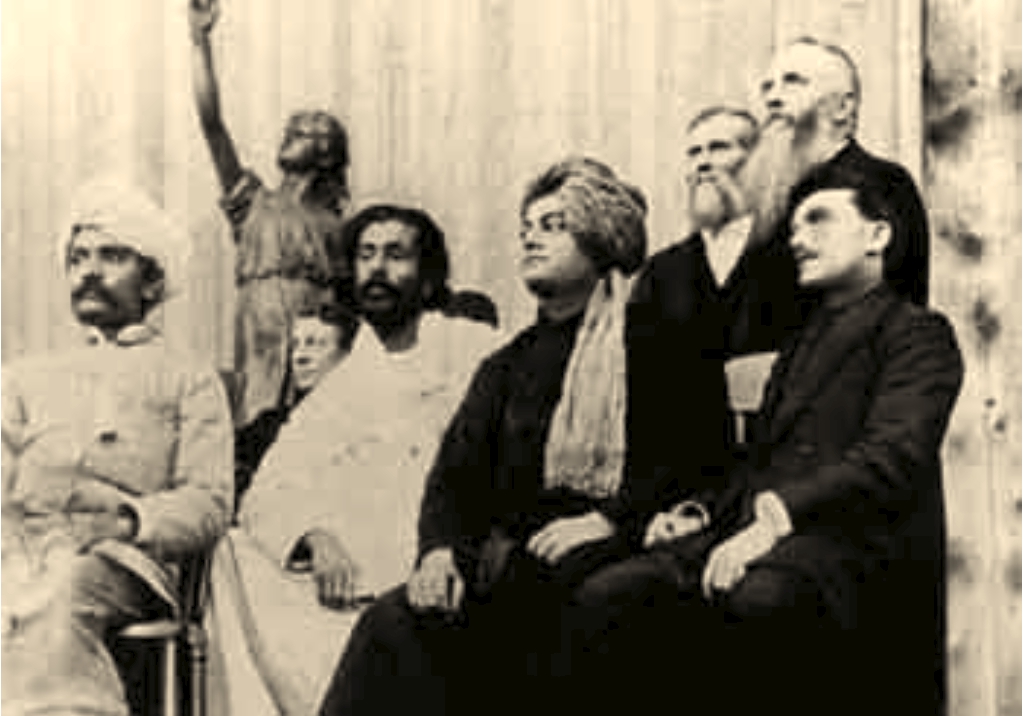
From Extreme Left:
Virchand Gandhi, H. Dharampala &
Swami Vivekanand on Dias at First Religions Parliament, Chicago, 1893
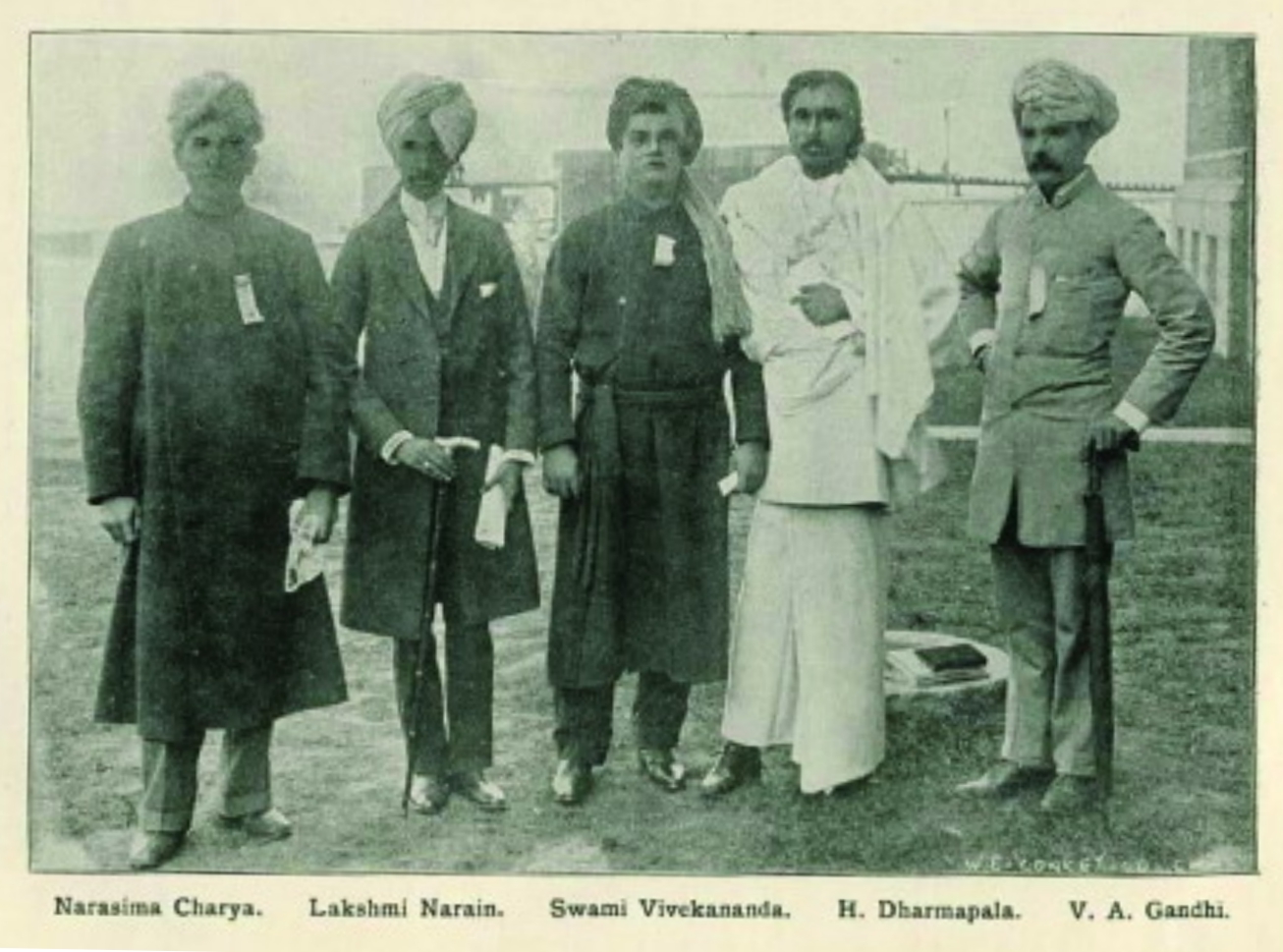
Snap of 1893 Prominent speakers available with World Religions Parliament.
VRG: extreme right
Following Speakers had participated from India in 1893 world religions parliament.
- Rajah Ram, of the Punjab.
- Virchand Raghavji Gandhi, Honorary Secretary of the Jain Association, of India, Bombay.
- Rev. P.C. Mazoomdar, India.
- H. Dharmapala, India. (Actually he was from Ceylon, which was part of British India at that time.)
- Miss Jeanne Serabji, Bombay.
- Swami Vivekananda, Bombay.
- Professor Chakravarti, Bombay.
- B. B.Nagarkar, Bombay,
- Jinda Ram, India.
- The Rev. Morris Phillips, of Madras.
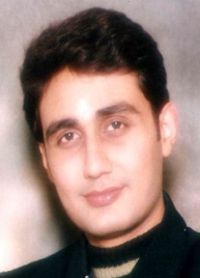 Pankaz Chandmal Hingarh
Pankaz Chandmal Hingarh
